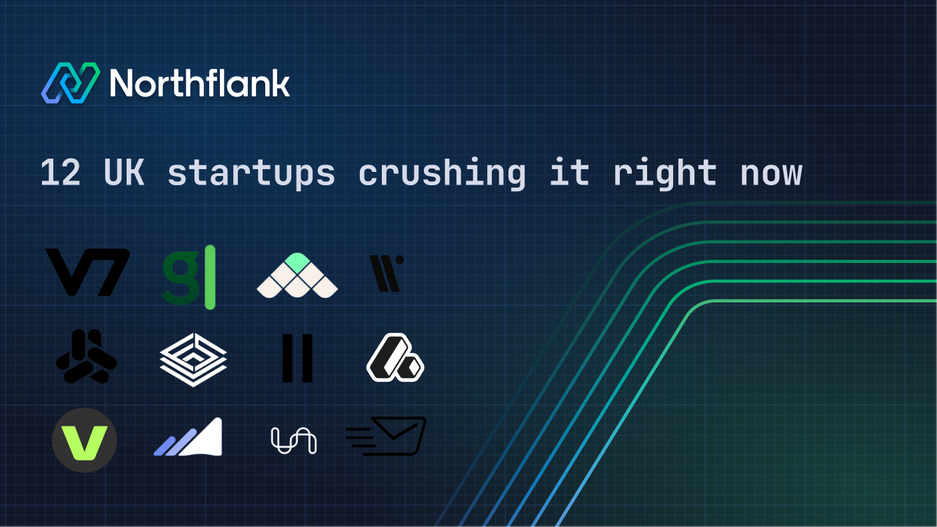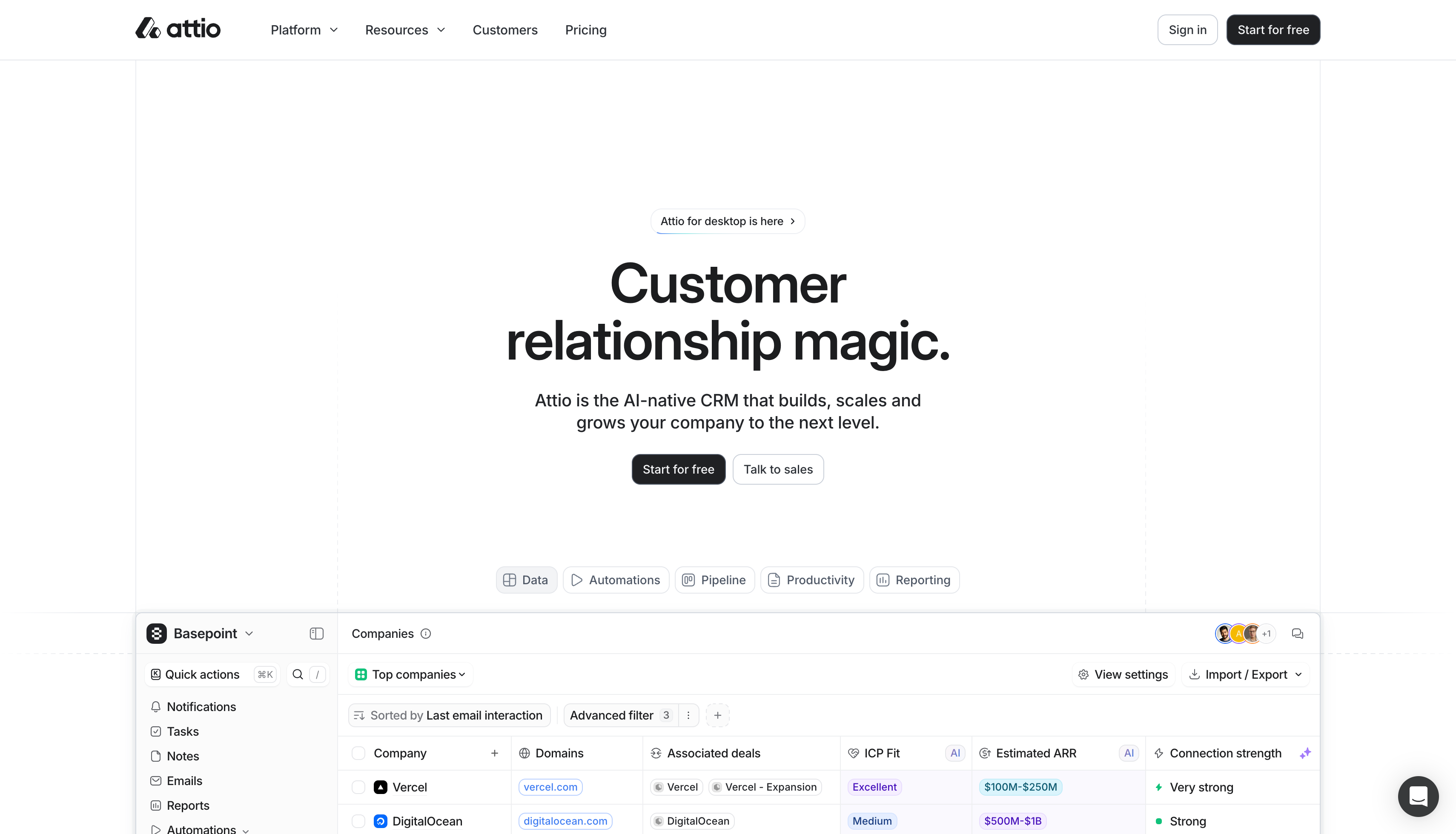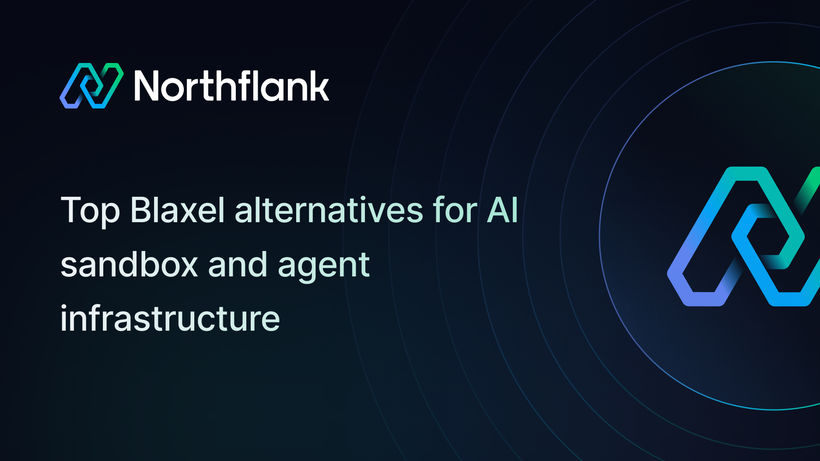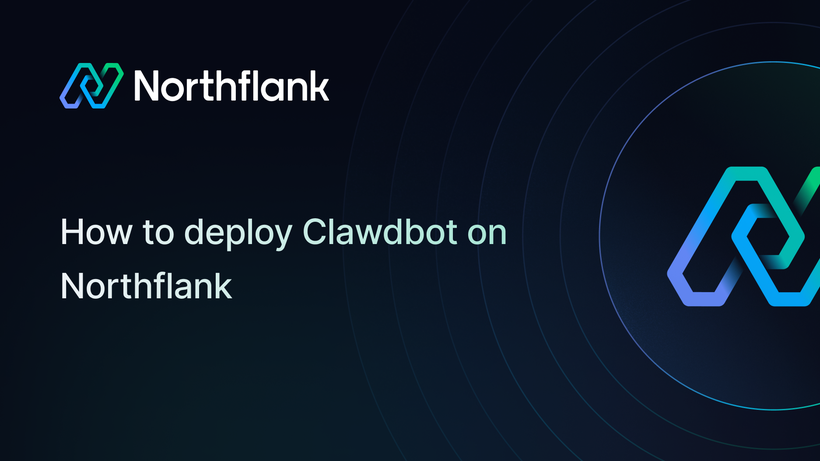

12 UK-based AI startups crushing it right now
As a UK-based company, we at Northflank are always rooting for other startups in the Land of Shakespeare and Shepherd’s Pie. Having spent five years as a VC, startups still catch my eye, inlcuindg UK AI startups. I’ll highlight products we use at Northflank and others that stand out for their ingenuity.
I’ve tried to highlight what makes these companies unique and why they’ll matter in the long run.
Keep in mind, this is just an outsider’s perspective, if anything here sparks your curiosity, I encourage you to check them out for yourself.
This isn’t a complete list, but it’s a snapshot of some of the most compelling UK AI startups we’ve seen recently.
We’ve grouped these by company, with a quick snapshot of what each one is building and where they’re based.
| Company | Headquarters | Total funding (USD) | Summary |
|---|---|---|---|
| V7 Labs (V7) | London | $43 million | Turning annotated data directly into self-improving AI agents. |
| Granola | London | $67 million | Enabling infinite recall of every conversation you’ve ever had. |
| Metaview | London | ~$50 million | Transforming interview content into actionable hiring intelligence. |
| Attio | London | ~$64 million | Making CRM powerful yet effortless for end-users. |
| VEED | London | $35 million | Empowering anyone to create professional videos through intuitive text-based editing. |
| CuspAI | Cambridge (UK) | $30 million | Turning materials science into an AI-driven search problem. |
| Latent Labs | London & San Francisco | $50 million | Accelerating biology by designing protein drugs on-demand. |
| Nscale | London | $155 million | Turning renewable energy into AI factories. |
| FluidStack | London | ~$4.5 million | Instantly unlocking GPU capacity through a self-reinforcing marketplace. |
| ElevenLabs | London & New York | $281 million | Building the definitive marketplace for realistic voice clones. |
| Fyxer AI | London | $10 million | Delivering AI-powered executive assistance built on real-world EA experience. |
| Wordsmith AI | Edinburgh (UK) | ~$30 million | Automating contract review to accelerate deal velocity. |

Most people know V7 for Darwin, its lightning-fast annotation platform. What’s less obvious is how V7 pairs that creator layer with V7 Go, a no-code “chain-of-thought” engine that turns the freshly-labeled data into multi-step AI agents.
Darwin’s SAM-2 and Auto-Annotate tools can segment anything from CT lesions to assembly-line parts in minutes, cutting label time by up to 95% and feeding a repository that now spans medical, industrial, and RLHF tasks. A 40k+ expert workforce keeps quality high and continuously expands that dataset across new verticals.
V7 Go breaks knowledge-work into steps that large-language models execute with explicit chain-of-thought reasoning, no API keys or coding required. The same interface pulls in PDFs, images, videos, call recordings, and the labels you just generated. V7 Go breaks knowledge-work into steps that large-language models execute with explicit chain-of-thought reasoning, no API keys or coding required. The same interface pulls in PDFs, images, videos, call recordings, and the labels you just generated.
Customers stay inside one ecosystem: annotate, fine-tune, deploy an agent, then watch that agent identify edge-cases that flow back to Darwin for re-labeling. V7 is not just an annotation tool and not just an LLM orchestration UI; it is a self-reinforcing system that manufactures high-quality multimodal data and immediately turns it into working AI agents. That data-to-agent flywheel is the non-obvious reason the company can keep shipping new vertical solutions faster than pure-play labeling platforms or standalone AI-agent startups. Beyond AI platforms like V7, startups looking to turn innovative concepts into functional products can benefit from development partners such as Anadea, who specialize in creating scalable software, web apps, and tailored digital solutions for ambitious teams.

This is one of those “IYKYK” products that seems like everyone is quietly using. For the uninitiated, Granola is a magical note-taking app that captures notes automatically in the background during meetings. I love that it takes my messy notes as a starting point, tidies them up, and enhances them into a bulleted call summary. It also has a handy Q&A feature where you can quickly ask questions across multiple conversations. This makes it an ideal solution for creating precise AI Meeting Minutes, capturing every important point without the usual manual effort. Granola doesn’t actually joins meetings, running instead silently in the background without storing recordings.
By eliminating the friction of joining meetings, Granola brings us closer to infinite recall of every conversation we’ve ever had. Right now, users initiate that recall. Soon, Granola could proactively deliver action items ahead of recurring meetings, remind you to follow up about a colleague’s recent trip, or surface key insights gathered from multiple customer conversations.

When you’re growing quickly, it’s tough to remember what was said in every candidate interview. Metaview is an AI scribe purpose-built for interviewing, and the product is remarkable. It generates the notes exactly as you’d expect them in an interview context and syncs seamlessly with our ATS. You can run Q&A across multiple interviews with a candidate (”What are their salary expectations? What’s their experience with Kubernetes?”). Its collaboration features help us avoid asking candidates duplicate questions and easily catch up on interviews we didn’t attend ourselves.
Metaview is much more than another AI notetaker. The product automates one of the most laborious and information lossy parts of the recruitment cycle: converting the content of an interview into a collaborative, information dense hiring decision. With LinkedIn commoditizing the resume, Metaview becomes the system of record for the most valuable data: the interview content.
With that foundation, Metaview can support every step of the interview journey. It already helps craft job descriptions and could soon handle targeted candidate outreach, timely follow-ups, and more. If your HRIS is the system of record for life after someone joins, Metaview is the system of record for everything that comes before.

Imagine a CRM re-imagined for the modern design era. Let’s be honest: Salesforce (especially) and Hubspot feel bloated and clunky. Attio is the exact opposite. We like this product not just for its customer pipeline and data management, but also because it shifts CRM power features like building automations and dashboards from IT to the users.
You can’t overstate how valuable it is to shift these capabilities away from IT and directly into users’ hands. Attio isn’t necessarily inventing new CRM features, it’s just making them effortless to use. Many powerful features in tools like Salesforce stay unused because enabling them typically involves third-party consultants and extensive planning. Attio stands out not for unique functionality, but because it makes adoption easy.

I’m a big fan of tools that unlock professional-level capabilities for the masses. Historically, if you ran a small business, creating professional videos was often out of reach due to high costs or complex software. VEED changes this by letting you edit and produce polished videos entirely through intuitive text-based editing and generation.
Every clip you upload is instantly transcribed, and that transcript becomes the core asset you use for editing. You can cut, reorder, or delete scenes just by editing the text. VEED also lets you give plain-English commands to its AI assistant, such as “remove my filler words” or “tighten the intro to 15 seconds.”
And then there is the data flywheel: each uploaded video adds paired audio-text-visual data, enriching VEED’s private corpus and improving its models, something few UK AI startups have pulled off at this scale.

This company is making the science fiction we imagined at the dawn of AI a reality. It turns materials science into a search problem powered by AI. Researchers simply describe the properties they need (such as a molecular sponge that captures carbon dioxide), and CuspAI proposes novel structures, reversing the usual “make then test” workflow and cutting discovery timelines.
Most materials-informatics platforms rifle through static databases of known compounds. CuspAI flips this workflow: you start with a property prompt, and then a generative model creates brand-new molecular or crystal structures on the fly and scores them in real time with physics-informed evaluators. The engine returns a ranked short-list that satisfies every constraint. This “inverse-design search engine” means the relevant design space is no longer the ~10 million compounds in public databases, but the uncountable universe of hypothetical materials.
CuspAI isn’t just “AI for materials.” It’s building the first property-queryable search engine that spans the entire hypothetical materials universe. That ability to generate and vet custom matter on demand rather than sift what already exists is the quiet breakthrough that sets the company apart.

What CuspAI is to materials science is what Latent Labs is to biology. A researcher describes a drug target for a particular disease, and the company’s model designs a protein drug that with the desired properties. This approach matters because it cuts down on costly “old school” experimentation and wet lab discovery.
This speed could translate to faster pandemic response, “on-demand” cancer neoantigen vaccines, or enzyme-replacement therapies tuned to treat inherited diseases. Every design–test cycle feeds new, high-fidelity structure-function data back into the model. Because Latent Labs owns both the generative engine and the experimental feedback, it can compound its moat in a way even AlphaFold never could: each project improves the prior, enabling ever more precise control over molecular behavior.

This company positions itself as Europe’s AI hyperscaler. It’s like CoreWeave, but with European sovereignty and a stated commitment to sustainable energy. Nscale provides GPU nodes, training clusters, inference services, and more. I’m a fan of the pure play AI hyperscalers, as the AI focus translates to less convoluted product offerings.
Don’t be quick to overlook the sustainability angle. Nscale’s flagship site in Glomfjord, Norway sits next to surplus hydro-electric capacity and Arctic air that provides free cooling. The campus runs on 100 % renewable energy and doesn’t tap a stressed national grid. By harvesting power that would otherwise be wasted (“stranded” megawatts) and co-locating liquid-cooled GPU racks right at the source, Nscale can drive electricity and cooling costs down to a level even hyperscalers in temperate climates struggle to match.
The bottleneck to AI isn’t GPUs, but power. Nscale’s edge is a playbook that turns stranded renewable energy into sovereign, high-density AI factories, a cost, carbon and compliance trifecta that competitors tied to conventional data center grids will find tough to clone.

We can’t talk about GPU clouds without mentioning Fluidstack’s single-tenant GPU offerings, which teaches us that liquidity beats scarcity. With creative financing and pre-negotiated GPU supply, Fluidstack can spin up a dedicated cluster in just 48 hours instead of the 8-to-12 week wait you get from the hyperscalers.
It also runs a public marketplace where companies list idle GPUs for on-demand rentals. As those renters scale, Fluidstack graduates them to high-margin private clusters; when those customers later have excess capacity, they feed it back into the marketplace. The result is a virtuous flywheel that keeps hardware busy and customers happy.

This might be the least controversial statement in startupland: ElevenLabs is ripping and for good reason. Their voice models are state-of-the-art, spanning text-to-speech, speech-to-text, conversational AI, voice cloning, and more.
Everyone talks about ElevenLabs’ uncanny realism, but the part most people miss is that the company is quietly building a two-sided “voice marketplace.” Anyone can upload a high-quality clone of their voice and list it for other others to license. Imagine Morgan Freeman narrating your favorite bedtime story or casually chatting with your favorite actor. That’s the future ElevenLabs is building, and it’s incredibly exciting.

Imagine having an assistant to organize your calendar and schedule meetings, take meeting notes and draft follow-up items, organize your inbox and draft emails for you. This is Fyxer, and AI-powered assistant.
Before writing a single line of code, Fyxer spent six-plus years running a fractional-EA agency that handled calendars, inboxes, and board-packet logistics for CEOs and scale-ups. Every permissioned email thread, scheduling wrangle, and follow-up template from that service was logged and labelled, adding up to more than half-a-million hours of “how top EAs actually work” data. That proprietary corpus now fuels the fine-tuning behind Fyxer AI, giving it context-savvy instincts that make it more than a generic copilot.

One of the hats I wear at Northflank is legal, which means I spend way too much time reviewing contracts… often relying on LLMs. I regularly find myself wishing there was a tool that could flag non-standard or overly aggressive clauses, prompt me to quickly review them, and then automate the redlines. I even went so far as writing a PRD to build exactly that on Northflank before stumbling across Wordsmith AI. It’s the ideal tool when bringing in a lawyer feels like overkill.
Again, we have a powerful data flywheel at play. Wordsmith proposes changes, the user approves them, the counterparty responds with edits, and Wordsmith continuously refines its understanding of market-standard contract terms.
Contract review is a bottleneck to value creation. It’s the opportunities that contracts enable (commerce, partnerships, talent management) that moves economies forward. Speed up contract review, and you speed up economic growth.
It’s a good time to be building in the UK. The caliber of talent, availability of capital, and wave of new infra make it a strong environment for ambitious teams. We’ll be watching these UK AI startups closely and probably using more of them ourselves!
If you’re a UK AI startup and need help with infrastructure, whether that’s setting up autoscaling APIs, managing multi-tenant environments, running fine-tuning jobs on GPUs, or just deploying faster without hiring a DevOps team, let’s chat. We support everything from model training to inference, and can run on your cloud or ours.



